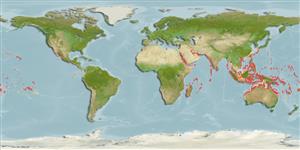Environment: milieu / climate zone / depth range / distribution range
นิเวศวิทยา
เกี่ยวกับทะเล,น้ำเค็ม เกี่ยวกับหินโสโครก; ระดับความลึก 1 - 30 m (Ref. 30573). Tropical; 32°N - 30°S
Indo-Pacific: Red Sea to Sodwana Bay, South Africa and to the Society Islands, north to the Ryukyu Islands, south to New Caledonia. Records from the Mascarene Islands lack verification and are probably based on Pterois antennata (Ref. 33390).
ขนาด / น้ำหนัก / Age
Maturity: Lm ? range ? - ? cm
Max length : 24.0 cm TL เพศผู้/กระเทย; (Ref. 9710); common length : 20.0 cm TL เพศผู้/กระเทย; (Ref. 5450)
เงี่ยงครีบหลัง (รวม) : 11 - 13; ก้านครีบอ่อนที่หาง (รวม) : 10 - 12; เงี่ยงครีบก้น: 3; ก้านครีบอ่อนที่ก้น: 6 - 7. This species is distinguished by the following characters: usually D XII,11 (rarely XII, 10 or XII, 12) and the pectoral-fin rays 16 (rarely 15, 17 or 18); scale rows in longitudinal series 51-57; relatively long fin days in the dorsal-fin with length of longest 30.9-40.5 (mean 35.8) % of SL, in the anal-fin with longest ray length 35.8-44.8 (40.4) % of SL, in the pectoral fin, the ninth ray length 75.6-113.2 (92.4) % of SL, and in pelvic-fin with longest ray 48.2-71.9 (60.0) % of SL with its posterior tip reaching or extending beyond vertical through posteriormost anal-fin
soft ray base when depressed; supraocular tentacle without lateral branches; the postorbital sensory canal absent or not connected to sphenotic spine base at any life history stage. Colouration: body sides with five broad dark black bands and a horizontal broad dark band on caudal peduncle; the fourth and fifth body bands relatively narrow, dorsal width 5.8-9.3
(mean 7.4) % of SL and 3.4-9.3 (7.3) % of SL, respectively; the fourth additional (inserted) marking relatively broad, dorsal width 2.1-4.9 (3.6) % of SL (Ref. 123589).
A generally uncommon species that inhabits lagoon and seaward reefs (Ref. 9710). Prefers rocky reefs and seems to avoid stony corals. Coastal, sometimes in surge zones where in narrow crevices, or along rock-walls in small caves (Ref. 48635). Found under ledges during the day (Ref. 9710). Feeds exclusively on small crabs and shrimps. Capable of inflicting a painful sting. Minimum depth reported taken from Ref. 30874.
Life cycle and mating behavior
Maturities | การสืบพันธุ์ | Spawnings | Egg(s) | Fecundities | ตัวอ่อน
Eschmeyer, W.N., 1986. Scorpaenidae. p. 463-478. In M.M. Smith and P.C. Heemstra (eds.) Smiths' sea fishes. Springer-Verlag, Berlin. (Ref. 4313)
IUCN Red List Status (Ref. 130435)
Human uses
การประมง: การประมงยังชีพ; สถานที่แสดงสัตว์และพืชน้ำ: การค้า
เครื่องมือ
Special reports
Download XML
แหล่งที่มาจากอินเตอร์เน็ต
Estimates based on models
Preferred temperature (Ref.
123201): 25.1 - 29.3, mean 28.4 °C (based on 3699 cells).
Phylogenetic diversity index (Ref.
82804): PD
50 = 0.5005 [Uniqueness, from 0.5 = low to 2.0 = high].
Bayesian length-weight: a=0.01023 (0.00444 - 0.02358), b=3.01 (2.82 - 3.20), in cm total length, based on LWR estimates for this (Sub)family-body shape (Ref.
93245).
ระดับชั้นอาหาร (Ref.
69278): 3.6 ±0.59 se; based on food items.
ความสามารถในการกลับคืนสู่ปกติ (Ref.
120179): ขนาดกลาง, เวลาต่ำสุดที่จะทำให้ประชากรเพิ่มขึ้นเป็น 2 เท่าใช้เวลา 1.4 - 4.4 ปี (Preliminary K or Fecundity.).
Fishing Vulnerability (Ref.
59153): Low vulnerability (14 of 100).
Nutrients (Ref.
124155): Calcium = 65.9 [34.6, 130.0] mg/100g; Iron = 0.702 [0.371, 1.671] mg/100g; Protein = 18 [16, 20] %; Omega3 = 0.198 [0.087, 0.523] g/100g; Selenium = 24.9 [13.6, 62.4] μg/100g; VitaminA = 209 [70, 584] μg/100g; Zinc = 1.33 [0.91, 1.95] mg/100g (wet weight);
